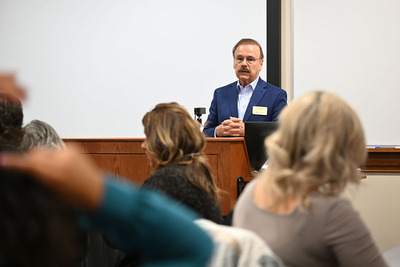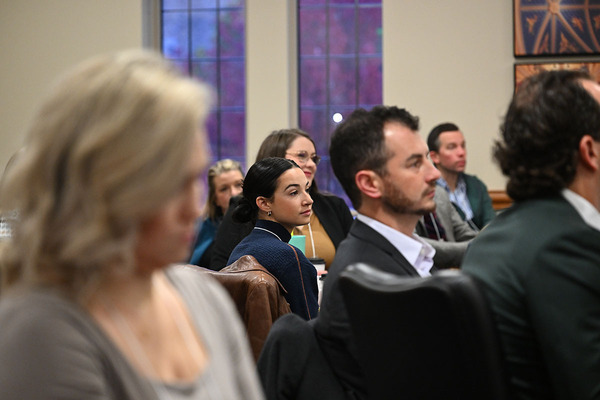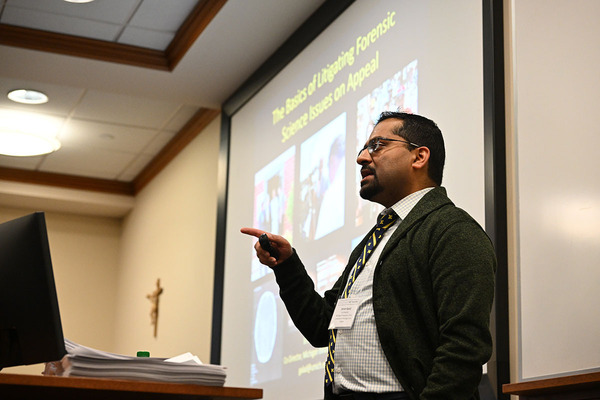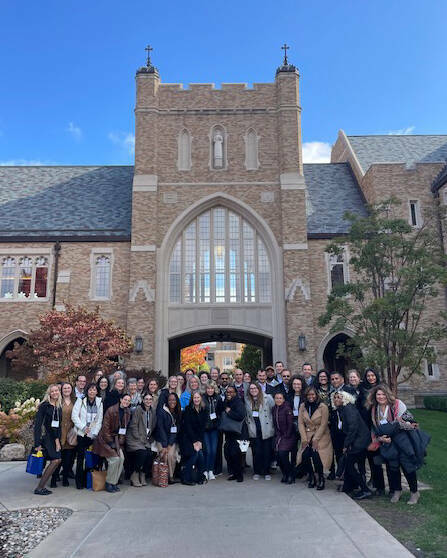ND Law’s Exoneration Justice Clinic hosts Innocence Network Midwest Regional Summit

Attorneys and investigators from wrongful-conviction clinics across the Midwest gathered at Notre Dame Law School on October 18-19 for the Innocence Network Midwest Regional Summit, hosted by the Law School’s Exoneration Justice Clinic.
The Innocence Network is a coalition of over 70 independent organizations dedicated to preventing wrongful convictions through policy change and strategic litigation, freeing the innocent from wrongful incarceration, and supporting the exonerated after they are released. Notre Dame Law School’s Exoneration Justice Clinic, which launched in fall 2020, is one of the Innocence Network’s newest members, having joined the coalition in March of this year.
More than 50 staff members from 13 organizations across eight states attended the Midwest Regional Summit at Notre Dame.
“We share a lot in common, everyone in this room,” Professor Jimmy Gurulé, director of the Exoneration Justice Clinic, said during his opening remarks at the summit. “First, we share a passion for justice. Second, we’re passionate about correcting and combating the miscarriage of justice that has resulted in our clients being wrongfully convicted for crimes that they did not commit.”

At the same time, Gurulé said, those who work in the innocence community share a daunting task in attempting to overturn wrongful convictions. Those challenges include a criminal law system “that favors finality over justice,” he said, and post-conviction procedures that are designed to make it as difficult as possible for the wrongfully convicted to prevail.
“How will we prevail? That’s why we’re here today,” Gurulé said to those in attendance. “It’s the collaboration, the cooperation, the sharing of talent, skill, knowledge, and experience that are present in this room here today. If we leverage that, if we work together to overcome these incredible legal hurdles and obstacles, we will prevail. This is so essential to the work that we do.”
The summit’s sessions covered a variety of topics, from current legal issues to emerging technological trends, that are of special relevance to innocence organizations.

Imran Syed, co-director the Michigan Innocence Clinic at the University of Michigan Law School, led a session on the basics of litigating forensic science issues on appeal. Fran Watson, founding director of the Wrongful Conviction Clinic at Indiana University Robert H. McKinney School of Law, facilitated a session on probabilistic genotyping and how to use DNA technology to win cases. Jose Burgos and Anna Kohn of Project Reentry at the Michigan State Appellate Defender Office presented a holistic approach to reentry with a focus on how organizations can support exonerated clients after they are released from prison.
Jennifer Bergeron, a clinical professor of law at the University of Cincinnati College of Law, where she works with the Ohio Innocence Project, delivered the summit’s keynote with Brian Dugger, an investigative reporter for WTOL in Toledo who won the 2020 Innocence Network Journalism Award for his reporting on Ohio Innocence Project clients. Their presentation, “The Media and You — Why the Relationship Matters,” focused on when and how to approach journalists, what journalists can and cannot offer, and how to manage unintended consequences from media coverage.

“We all know that this work is urgent, necessary, and transformative, but we also know that it can be arduous, discouraging, and even lonely at times,” said Cait Murray, assistant director of network stakeholder engagement at the Innocence Project, which is the headquarters of the Innocence Network.
“That is why building community, sharing knowledge and expertise, engaging in collective action, and creating opportunities for mutual support and healing are so central,” Murray said. “The hope is that gatherings like this one help to sustain each of us and remind us all that we are part of a powerful and diverse movement, that there are others we can depend on and learn from, and that ultimately we are not alone.”
Learn more about Notre Dame Law School’s Exoneration Justice Clinic at exoneration.nd.edu.